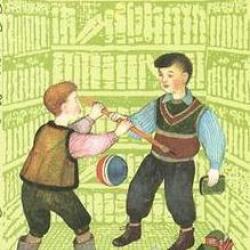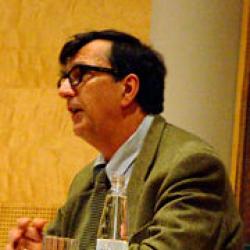First World War. Lessons from the First World War First World War history lesson
One of the tasks that the organizers set for themselves is commemorative events dedicated to the centenary of the beginning First World War- is to return to our society the knowledge of forgotten pages of history. There is hope that along with such knowledge will come understanding history lessons. Rossiyskaya Gazeta talks about one of these events.
Professional discussions of historians, learned by politicians, can influence the resolution of many modern conflicts and disputes, the State Duma speaker is convinced Sergey Naryshkin. “After all, large ‘fires’ in world history have flared up more than once from similar conflicts. And their roots lay not only in economics, but in the very misunderstanding of peoples, in ignorance of each other’s culture,” Naryshkin said, opening a discussion at the international round table"The First World War: Culture and Memory", organized by UNESCO And Russian Historical Society V Paris.
Not everyone in the current situation believed in the success of this event. But at the round table were authoritative historians, parliamentarians, cultural figures not only from Russia and France, but also Serbia, Finland, Germany, Lithuania, Latvia, Great Britain, and Poland.
Many countries in the world are rethinking the lessons of the First World War, Naryshkin noted, expressing great respect for those who, “despite all the pressure and rabid propaganda, continue to develop international contacts.” The Chairman of the State Duma believes that “in today’s conditions, against the backdrop of well-known events in international politics, there is a deep political crisis that is currently tearing apart Ukraine", such meetings are extremely important. “Only dialogue, joint, without confrontation, understanding of both the past and the present will open the way for us to a truly common future, to the creation of a Europe without dividing lines."
The speaker of the State Duma told what Russia is doing on the eve of a significant date for the whole world: August 1 became the Day of Remembrance of Soldiers who died in 1914-1918, preparations for installation are being completed Monument to the Unknown Soldier of the First World War, the digitization of the card index of losses on the fronts of this war has begun, a project is being implemented, the purpose of which is to collect materials from family archives, and educational and scientific conferences are being held.
Director of the State Archive of Russia Sergey Mironenko reported on preparations multimedia exhibition, which will show the history of the war “with photographic accuracy.” Head of the Federal Archival Agency Andrey Artizov reported the news - on military historical archive website secret documents from that war have been posted - all inventory records - “this is a complete set of the old Russian army,” available in Moscow and Warsaw - everywhere.
The participants in the discussion, among whom were descendants of those who fought on the fronts of the First World War, argued that the war caused irreparable spiritual damage to all of Europe. In 1914, each of the hostile camps went to the First World War “under the flag of “national defense,” recalled Sergei Naryshkin. Artists and scientists from different countries, who had collaborated amicably before the war, broke ties, blamed each other, foreign states and peoples. “It’s impossible.” forget also that it was interwar Europe that became the place where Nazi ideology emerged,” Naryshkin emphasized, noting that the popularity of such views was not limited to the borders of one country - “at that time, fascist movements were not uncommon.”
“I would like to hope that the modern world has learned the main lessons of the past. And the task of those who are responsible for culture will always be to bring peoples closer together, and not to pit them against each other,” the speaker said, noting that, at least, this is evidenced activities of organizations such as UNESCO. Naryshkin believes that this organization deserves the most serious support. Our country has provided it for six decades and will continue to do so in the future.
- Tell your friends about it!
PUBLICATIONS FOR THOSE WHO MONITOR INCOME AND EXPENSES All news about pensions and money Pension news Military pensioners Working pensioners
Lesson topic: First World War
The purpose of the lesson: systematize and generalize knowledge aboutPthe First World War and Russia's participation in it.
Tasks:
A) educational: find out the reasons and goals of the participants in the First World War;
Determine the nature of the war on Russia’s part;
Characterize the course of military operations on the Eastern Front;
Draw a conclusion about the role Russia played in the war.
b)developing: continue to develop the ability to express one’s own understanding of issues and problems related to this topic
V)educational: stimulate the development of a deep and lasting interest in history
Lesson type: combined
Teaching methods: explanatory and illustrative
Lesson materials : Map, presentation, textbook “The World in the 20th Century” by O.S. Soroka-Tsyupa, schemes
Interdisciplinary connections: "Russian history"
Course and content of the lesson:
1. Introductory and motivational stage.
1.1. Checking group students
1.2. Communicating the purpose and topic of the lesson
2. Updating basic knowledge on this topic"Countries of Asia and America at the end of the 19th - beginning of the 20th centuries."
Independent work on options
3. Presentation of new material
2. Goals of the participants in the war
3. "Schliefen Plan"
1. Causes and occasion of the First World War
The First World War (August 1, 1914 – November 11, 1918) began as a result of the aggravation of contradictions between the developed countries of the world at the beginning of the 20th century. The power of weapons increased every year, chauvinistic propaganda did its job - it unleashed national hatred, the ruling circles became more and more eager for the implementation of plans for conquest.
The reason for the outbreak of the First World War was the assassination on June 28, 1914 in the Bosnian city of Sarajevo of the heir to the Austro-Hungarian throne, Erz Duke Franz Ferdinand, by a member of the Mlada Bosna organization, Gavril Princip. Duke Ertz was the commander-in-chief of the army of Austria-Hungary and arrived in Sarajevo to participate in military maneuvers that were to take place on the border with Serbia. For the Serbs, June 28 was a day of national mourning. On this day, the memory of the Serbs who died in the battle with the Turks on Kosovo in 1389 was honored. Serbian national circles regarded this visit as an insult.
After the death of the Erz-Duke, the German Emperor Wilhelm II suggested that the Austro-Hungarian Emperor Franz Joseph “put an end to the Serbs”, using the Sarajevo murder as a pretext for declaring war. The Austro-Hungarian government gave Serbia 48 hours to comply with a series of ultimatums.
Historical calendar .
June 28, 1914 - assassination of the heir to the Austrian throne, Franz Ferdinand, in Sarajevo
2. Goals of the participants in the war
Entente countries
France - Weakening of Germany, return of Alsace and Lorraine
Great Britain - Weakening of Germany, the seizure of its colonies, maintaining superiority at sea.
Russia - Strengthening in the Balkans, helping Serbia, capturing the Black Sea straits.
Triple Alliance
Germany - Conquest of hegemony in Europe, defeat of France, seizure of the European part of Russia, redistribution of colonies.
Austria-Hungary - Strengthening positions in the Balkans, defeat of Serbia, weakening of Russia.
Italy -capture of Tyrol and French colonies in Africa
Plans of the parties
Germany- the “blitzkrieg” plan, first the defeat of France, then Russia
Russia- main blow to Austria-Hungary
France- protecting its border with Belgium
Austria-Hungary- war on 2 fronts: against Russia and Serbia
England- limited participation in the war (to rake in the heat with someone else’s hands)
3. "Schliefen Plan"
Moltke H.I. - Chief of the General Staff of Germany.
Shliefen A. - developer of the lightning war plan.
Schliefen Plan
1. Get rid of a war on two fronts, prevent a protracted war, which threatened Germany with defeat, since Germany was inferior to its opponents in terms of raw materials, food and human resources.
2. Invade France through Belgium; England will not provide France with serious support;
3. Win a victory over France before the fall, i.e. until Russia is ready for hostilities;
4. Then crush Russia.
4. Main fronts of the First World War
Fronts of the First World War: in Europe, Transcaucasia, the Middle East,
in the Pacific Ocean, in Africa.
The war woreaggressive nature On the Russian side, the war also bore an imperialist character.
5. Military actions from 1914-1918
Periods
Western Front
Eastern front
Result
1914
The advance of German troops through Belgium. Battle of the Marne. German troops are stopped and driven back from Paris. Naval blockade of Germany by the British fleet
Unsuccessful offensive of two Russian armies (generals P.K. Renenkampf and A.V. Samsonov) in East Prussia. The offensive of Russian troops in Galicia against Austria-Hungary.
The East Prussian operation of Russian troops helped the French and British survive the Battle of the Marne River. The Schlieffen Plan failed; Germany could not avoid a war on two fronts. The Ottoman Empire joined Germany and Austria-Hungary.
1915
There were almost no active military operations. Germany's merciless submarine war against the Entente fleet. The first chemical attack in history by German troops on Ypres (Belgium).
The offensive of Germany and Austria-Hungary against Russian troops. The Russian army is forced to retreat with heavy losses. Russia lost Poland, part of the Baltic states, Belarus and Ukraine. Bulgaria sided with Germany (the Central Powers).
Germany and its allies failed to eliminate the Eastern Front. Positional (“trench”) warfare. France and England strengthened their military potential. There was a military-economic superiority of the Entente countries.
1916
The advance of the German army towards Verdun. The first use of tanks by Entente troops and the offensive on the Somme River.
The Russian army under the command of General Brusilov broke through the Austro-Hungarian front in Galicia and Bukovina (“Brusilovsky breakthrough”). However, it was not possible to develop the success of the Russian army.
The battles of Verdun and the Somme did not give a decisive advantage to either side. It became clear that Germany would not be able to win the war; Austria-Hungary was on the verge of complete defeat.
1917
In the battles on the fields of France, neither the Central Powers nor the Entente managed to achieve a decisive victory. The US entered the war on the side of the Entente.
Revolution in February-March 1917 in Russia. The fall of the monarchy. Provisional Government - “War to a victorious end!” Decree on peace of the Bolshevik government. The call to conclude peace without annexation and indemnity is not supported by either Germany or the Entente.
Enormous losses forced the Anglo-French command to stop major offensive operations. The entry of the United States into the war led to the economic and military superiority of the Entente. Revolutionary Russia, exhausted by the war, could not continue the fight.
1918
The offensive of German troops in France (P. Hindenburg, E. Ludendorff) on Paris. On the Marne, a counter-offensive by Entente troops under the command of the French general F. Foch. US President William Wilson proposed the “14 Points” peace plan. The revolt of military sailors in Kiel was the beginning of the German revolution. The Social Democratic government concluded a truce with the Entente in the Compiegne Forest on November 11, 1918.
In March 1918, the Bolshevik government concluded a separate Treaty of Brest-Litovsk with Germany.
The Eastern Front ceased to exist. Germany got rid of the need to fight on two fronts. Bulgaria left the war. The Ottoman Empire surrendered. Revolutions in Czechoslovakia and Hungary led to the disintegration of Austria-Hungary and its military collapse. End of the First World War. Victory of the Entente countries.
World War I 1914-1918
date
Events
September 1914
Battle of the Marne. Stabilization.
October 1914
Turkey's entry into the war. Opening of military operations in the Black Sea and Transcaucasia.
May 1915
Italy's entry into the war on the side of the Entente
Summer 1915
great retreat" of the Russian army on the Eastern Front
October 1915
Bulgaria's entry into the war
1915
naval war with England (submarines)
February–March 1916
Verdun meat grinder (1 million soldiers)
June-August 1916
Brusilovsky breakthrough
Autumn 1916
Battle of the Somme (tanks)
May 1916
Jutland naval battle
April 1917
US entry into the war
August 1918
massive Entente offensive on the Western Front
6. Treaty of Brest-Litovsk, Truce of Compiegne
March 3, 1918 was signedTreaty of Brest-Litovsk , according to which Ukraine, Finland, Georgia, Poland and the Baltic states were torn away from Soviet Russia, but the country received the respite it needed
November 11, 1918- In the Forest of Compiègne (France), an armistice was signed between the victors (the Entente countries) and the defeated Germany.
7. Results of the First World War
33 countries took part in the First World War.(1.5 billion people)
Collapse of empires: German, Russian, Austro-Hungarian, Ottoman
More than 10 million dead. Economic crisis, famine, devastation in all countries of the world.
4 . Fixing the material: Teating tasks.
1 option
1. Germany declared war on Russia:
A) 06/28/1914; B) 07/28/1914; B) 01.08.1914; D) 08/03/1914
2. The “Schlieffen Plan” provided for the maintenance of:
D) Coalition war
3. The Entente was not part of the military-political alliance:
4. The “Schlieffen Plan” was put into action by the command:
5. Austria-Hungary declared war on Serbia in:
6. The following took part in the First World War:
7. The Triple Alliance did not include:
8. Complete the definition
Annexation – ………., …………. .territory of a foreign state against the will of its population
9. What region was called at the beginning of the 20th century. “the powder keg of Europe”?
A) Polish lands that were part of Russia; B) Balkans; B) the German Empire.
10. Who was the Supreme Commander-in-Chief of the Russian army in the initial period of the First World War?
Option 2
1. The “Schlieffen Plan” provided for the maintenance of:
A) maneuver warfare; B) Lightning War; B) Positional war;
D) Coalition war;
2. The “Schlieffen Plan” was put into action by the command:
A) Germany; B) Austria-Hungary; B) Italy; D) France
3. The following took part in the First World War:
A) 23 countries; B) 28 countries; B) 35 countries; D) 38 countries
4. The Triple Alliance did not include:
A) Germany; B) Austria-Hungary; B) Italy; D) Russia
5. Complete the definition
Annexation - …………………………territory of a foreign state against the will of its people
6. Who was the Supreme Commander-in-Chief of the Russian army in the initial period of the First World War?
A) Nicholas II; B) Grand Duke Nikolai Nikolaevich; B) A. A. Brusilov.
7. Germany declared war on Russia:
A) 06/28/1914; B) 07/28/1914; B) 08/01/1914; D) 08/03/1914
8. The Entente was not part of the military-political alliance:
A) Romania; B) Bulgaria; B) Italy; D) France
9. Austria-Hungary declared war on Serbia in:
A) 06/28/1914; B) 07/28/1914; B) 08/01/1914; D) 08/03/1914
10. Austria-Hungary declared war on Serbia in:
A) 06/28/1914; B) 07/28/1914; B) 08/01/1914; D) 08/03/1914
5. Reflective-evaluative: summing up the lesson, grading the lesson
6. Homework: “The World in the 20th Century” O.S. Soroka-Tsyupa, paragraph 12, fill out the table “Chronological events of the war”
Beginning of the 20th century characterized by an intensification of the struggle between countries for markets for raw materials and sales of goods, for dominance in the international arena. In connection with the expansion of German expansion, Russia and Great Britain signed an agreement in 1907 on the division of spheres of influence in Iran, Afghanistan and Tibet. Following the “cordial agreement” of France and England in 1904, the Russian-English agreement led to the formation of the Russian-French-English union, which finally took shape in 1907 and received the name Entente. Europe split into two hostile camps - the Triple Alliance (Germany, Italy, Austria-Hungary) and the Entente (France, England, Russia). The First World War began.
Causes of the First World War
- Exacerbation of contradictions between industrial powers over markets for sources of raw materials and spheres of influence.
- The struggle for the redistribution of the world between the Triple Alliance and the Entente.
- The desire of developed countries for expansion - territorial, military-political, financial-economic, socio-cultural expansion.
Russia's goals in the war
- Strengthening Russia's position in the Balkans while providing assistance to the Slavic peoples.
- The fight for control of the Black Sea! straits.
- Countering the aggression of Austria-Hungary against Serbia.
Reason for war
June 28, 1914. The assassination of the heir to the Austro-Hungarian throne, Era-Duke Franz Ferdinand, was committed in Sarajevo by Bosnian high school student Gavrilo Princip, a Serb by nationality.
World War I.
MAIN EVENTS
1914 |
|
| July 23 | Austria-Hungary, with the support of Germany, accused Serbia of the murder and issued an ultimatum to it. |
| July 28th | Austria-Hungary declared non-compliance with the ultimatum and declared war on Serbia. |
| July 30-31 | Mobilization began in Russia. |
| August 1 | Germany, in response to the mobilization that had begun, declared war on Russia. |
| August 3rd | Germany declared war on France. |
| August 4 | England entered the war. |
| August 6 | Austria-Hungary declared war on Russia. |
| Autumn | A number of military operations were carried out, the capture of Lvov by Russian troops, the defeat of the 2nd Russian army. |
| Results: 1) Germany’s strategic plan was thwarted - the lightning and successive defeat of France and Russia, 2) neither side achieved decisive successes. | |
1915 |
|
| During a year | The main combat operations were transferred to the Eastern Front, the goal being the defeat of the Russian troops. |
| Spring Summer | A breakthrough was made by German troops: Russian troops were driven out of Galicia, Poland, parts of the Baltic states, Ukraine and Belarus. |
| 8 September | Nicholas II assumed the role of commander in chief. |
| By the end of the year | The war on all fronts took on a positional character, which was extremely disadvantageous for Germany. The German command decided to once again shift its efforts to the Western Front, making a breakthrough in the area of the French fortress of Verdun. |
| Results: 1) Germany’s strategic plan to take Russia out of the war was thwarted, 2) the struggle acquired a positional character on all fronts. | |
1916 |
|
| February 13-16 | Russian troops occupied Erzurum. |
| March 18-30 | The Naroch operation was carried out - an offensive by Russian troops that did not have military success, but eased the position of the allies near Verdun. |
| May 22 - September 7 | During the Brusilov breakthrough of Russian troops on the Southwestern Front, the armies of Austria-Hungary and Germany were defeated. |
| During a year | Germany lost the strategic initiative. |
| Results: 1) the offensive of Russian troops saved the French fortress of Verdun, 2) Germany lost its strategic initiative, 3) Romania took the side of the Entente. | |
1917-1918 |
|
| Winter 1917 | The Mitavsk and Trebizond operations were carried out. |
| April 18, 1917 | A note from the Minister of Foreign Affairs of the Provisional Government of Russia, P. N. Milyukov, on Russia’s loyalty to its allied obligations has been published. The document is addressed to the governments of the Entente countries. |
| November 7, 1917 | October Revolution in Russia. The Bolsheviks who came to power immediately adopted the Decree on Peace. |
| December 15, 1917 | Soviet Russia signed a separate armistice with Germany and Turkey. |
| February 18, 1918 | The offensive of the Austro-German troops along the entire Eastern Front after the refusal of the People's Commissar for Foreign Affairs of the Soviet government L. D. Trotsky to agree to the German ultimatum. |
| March 3, 1918 | The Treaty of Brest-Litovsk was concluded between Soviet Russia and the Central European powers (Germany, Austria-Hungary), Turkey. |
| Results: 1) the Russian army is completely demoralized, the people demand peace, 2) on November 20 (December 3), 1917, the Bolsheviks who took power began negotiations for peace, and on March 3, 1918, the Brest Peace Treaty was signed. | |

Results of the war for Russia
- The Russian Empire lost Poland, Finland, the Baltic states, Ukraine and part of Belarus (the territories went to Germany, some of them were formally declared independent).
- Russia lost Kars, Ardahan, and Batum to Turkey.
- Germany was paid 6 billion marks in indemnity.

The impact of the war on Russian society
At the beginning of hostilities, the country was captured by a wave of patriotism. But after the first defeats of the Russian army, a significant part of society realized the futility of the war for Russia.
The First World War made life very difficult for people. The industry's focus on military orders led to a shortage of consumer goods, which caused a significant increase in their prices. In addition, the congestion of the railways with military transport led to interruptions in the supply of food to large cities.
By 1916, the strike movement had gained strength again, and along with economic demands, political demands were also heard. Due to the difficult economic situation, peasants did not want to sell agricultural products, preferring to wait for better times. By the end of 1916, in 31 provinces the government was forced to introduce surplus appropriation- forced delivery of bread at fixed prices.
Starting last year, August 1 is celebrated as the Day of Remembrance of Russian soldiers who died in the First World War. More than three million of our compatriots died in a terrible war. Today, the memory of the tragic events of the last century should help draw the necessary lessons. Which ones exactly - parliamentarians told the Parliamentary Newspaper.
Question of the week: what are the lessons of the First World War?
Vladimir Komoedov, Chairman of the State Duma Committee on Defense, Communist Party faction:
The most important lesson: a bad peace is better than a good war. For Russia, the First World War, which we largely won, turned into a terrible disaster. This war destroyed our country: the satellite countries left, we gave up the Baltic states. The Brest-Litovsk Peace Treaty and other agreements laid a time bomb called “Leninist national policy.” As a result, this mine exploded in 1991. Unfortunately, we are still seeing the consequences of all this.
The First World War revealed serious flaws in the government that ruled the country at that time. And these vices were combined with the unprincipled policy of the so-called “partners” of the Russian Empire, who collaborated with Russia, but worked against it. As a result, our country suffered the greatest losses: human and material. England achieved the goals it set for itself in the First World War. They didn't need a strong Russia.
We are now on the threshold of the Third World War, when many countries have united against us because they see that Russia is rising. They want to weaken our country again and are provoking it. They really want to drag us into a war, they are doing everything to achieve this. They found a country that is closest to us in spirit, mentality and blood, fooled people, found traitors to national interests. Today, in the civil war, the fraternal Ukrainian people are being destroyed, people are being turned against Russia. Ultimately, Russia will be blamed for the devastation in Ukraine.
Mikhail Zapolev, Member of the State Duma Committee on International Affairs, Communist Party faction:
Lesson one: prevent a repeat of that war. On July 27, 1914, people lived in peace, and on July 28, war began. Everything can happen unexpectedly. There is a documentary on television about the First World War: they show what happened: battles, explosions, military marches and negotiations. Is this the main thing? The main thing is to tell people that today we are on the threshold of approximately the same situation. The names are different, and the pre-war events are repeated. There should be a call from everywhere to prevent a new war.
Yaroslav Nilov, Chairman of the State Duma Committee on Public Associations and Religious Organizations, Deputy Head of the LDPR faction:
After the end of the war and the signing of the Treaty of Versailles, a number of restrictions were imposed on Germany. In particular, they were not allowed to have their own military equipment or train military specialists. In Russia, in the Lipetsk region, there was a military flight school where German aces were trained, including Goering. And then these aces bombed the Soviet Union in 1941. We helped those who later attacked us. And this should have served as a lesson for us. Until recently, we provided assistance to Ukraine, sold preferential gas, these were our brothers, but now it turns out that Russia has become an enemy for Ukraine, and they are shelling our border territories.
Russia's participation in World War I set the stage for the 1917 Revolution. Discontent was brewing in the army, there was a negative attitude towards the authorities, people did not have enough food.
The First World War largely gave rise to fascism in Europe. Adolf Hitler participated in the fighting, then various left-wing communist movements began to emerge in Munich, and Hitler and his associates had the understanding that the Treaty of Versailles was disastrous for Germany. In the wake of dissatisfaction with the results of the war, the development of fascist ideology began. Germany was then in a serious economic crisis, and financial assistance from America allowed the Nazi Party to quickly strengthen and develop. At the same time, America was an ally of the Soviet Union. The development of fascism in Europe led to the outbreak of World War II.
Now the situation in the world is unstable, and any match can break out a big fire, just like at the beginning of the twentieth century. It is important to prevent a repetition of those events.
Ilya Drozdov, Member of the State Duma Committee on Affairs of the Commonwealth of Independent States, Eurasian Integration and Relations with Compatriots, LDPR faction:
Judging by recent events, most countries have not learned any lessons from the First World War. The situation is again on the brink of another war, which could well develop into the Third World War. If we recall the events of a century ago, then the only country that profited from the bloodbath was the United States. Today the situation is repeating itself. The Americans are again “ruling” from overseas, pitting Europe and Russia against each other. It is a fact. It only remains to add that Russia does not lose wars and is strong enough to protect itself and its citizens. Therefore, the Americans’ attempts will remain their attempts.
Oleg Nilov, Member of the State Duma Committee on Transport, A Just Russia faction:
These lessons exist, but they were never learned by humanity during the 20th century. First of all, no war brings victory and satisfaction. There is only one result - millions of casualties, which are the main reproach to all military strategists. But repetitions of these criminal mistakes are possible, there are all the fundamental foundations for this, they are laid down in the foundations of the budgetary policy of financing the military-industrial complex of any state. This is the saddest conclusion to date.
Valery Ryazansky, Chairman of the Federation Council Committee on Social Policy:
- The main lesson should be the understanding that over the past century our country has lost a huge number of friends. Serbia remained the only state loyal to Russia. Many countries that were on the side of the Serbs in the First World War, subsequently, having already united in NATO, bombed Belgrade. And only Russia did not betray.
Let me remind you that Soviet history was silent about the main results and consequences of the First World War, so no worthy monuments to that great war were created on the territory of our country, which is also a lesson, but today we have drawn conclusions from it and are gradually improving.
Dmitry Sablin,
The most important lesson is that it has become obvious: Russia’s external enemies are not scary, it is its internal enemies that are scary. These traitors can destroy the country from within. There is a lot to be said about the First World War. But the most important thing that cannot be left to chance is the fight against internal enemies both in power and in the ranks.
Valery Shnyakin, Member of the Federation Council Committee on Defense and Security:
- The first lesson, the most basic, is that we need to remember our history and the tragedy that Russia experienced. Further, we must not forget that the First World War, in fact, led to the Revolution. If it had not happened, it is unknown who and to whom would dictate conditions in the world today. I completely agree with the words of Arkady Stolypin that we do not need revolutions and upheavals, but we need a great Russia. And we need to remember this. But, unfortunately, neither the First nor the Second World Wars taught politicians and statesmen to learn from their mistakes.
Prepared by Maria Sokolova, Ksenia Redichkina





